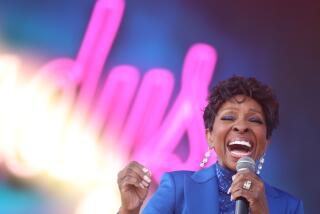POP REVIEWS : A Reverence for Rock at Weekend Concerts : At Worship With Depeche Mode
- Share via
“This is religion. . . . There’s no doubt,” sang David Gahan early in Depeche Mode’s concert Saturday at the Rose Bowl, underscoring the obvious for believers and non-believers alike.
Pagan rituals don’t come any grander than the spooky spectacle carried out under clouded skies in Pasadena, where the revered English pop group inspired tens of thousands of largely black-clad followers to hold matches up against the fading dusk that ushered in the quartet’s arrival. About 70,000 pairs of arms swayed in incongruous unison with the disturbing electronic textures of “Sacred,” as if in mockery of a church youth retreat.
And it was right about the time in the very next song--the doom-laden, deity-doubting “Blasphemous Rumours”--that Gahan was getting the masses to sing along with the chorus (“I think God’s got a sick sense of humor, and when I die, I expect to find him laughing”) when bolts of lightning began to shower around the Rose Bowl, along with near-miraculous late-June rain.
Depeche Mode just may be this generation’s Pink Floyd; that group’s eerie progressive rock influence is well on display in Mode’s creepily effective LP “Music for the Masses,” which in some darker moments recalls Floyd’s depression-and-death classic “Dark Side of the Moon.”
But a more contemporary counterpart for the band’s mixture of spiritual and profane strains came to mind repeatedly during Saturday’s show: Prince.
All the suggestive hip-grinding moves vocalist Gahan made on stage while singing writer-keyboardist Martin Gore’s thoughtful, sensitive, often hurting lyrics sometimes seem inappropriate. So can his frequent, encouraging yelps of “Sing it!” But there’s method to the madness of juxtaposing Gore’s Angst with Gahan’s sexuality.
Gore looks into the void in one of the newer songs played and finds “Nothing.” The closest thing to a consolation offered, in “Pleasure, Little Treasure” (a lively choice, and the one song to feature a guitar on stage in addition to all the electronic keyboards).
But if Prince--who celebrates Jesus and sex almost in the same breath--seems to view the quest for pure pleasure as a literal mandate from God, Depeche Mode seeks it in reaction to the void left by an absent (or laughing) higher power.
At times it can be compelling--and melodically lovely, even--stuff, somewhat but not entirely compromised by Gahan’s sillier posturings. And, oh yes, like Prince, many of Depeche Mode’s songs have a beat , which was the very first factor cited by most of dozens of fans interviewed in the stands.
Among those citing entirely rhythmic reasons for supporting the band was Jim Chavez, who was manning one of four lonely Amnesty International petition-signing booths and who likes Mode’s oft-danceable music but not the severely introspective lyrics.
“There’s a big difference between these kids and U2 fans,” said Chavez. “U2 people usually know what Amnesty is and want to get involved. Depeche Mode (fans) are more teeny-bopperish and into themselves than the world.”
Disagreeing was Gina DeSantis, 23, of Glendora, who finds the emotional and spiritual longings in Gore’s songs “hopeful” and says the group is “speaking to each one of us about how we can help the world as individuals. . . . And, the beat gets me excited.”
And it excites more people in Los Angeles than any other American city by far, evidenced by the band capping off its American tour here with its first U.S. stadium date ever.
Also on the lengthy bill, dubbed “Monsters of KROQ” by some: teen dreams OMD, whose light-footedness and lightheadedness were on equal par; Thomas Dolby & the Lost Toy People, whose delightful white funk/be-bop/rock arrangement intricacies got sadly lost in the sound mix; and the seminal English semipunk band Wire, an odd choice that baffled the entering crowd with more difficult, “industrial” sounds, which no doubt had a big influence on the headliner’s mechanized sound.
More to Read
The biggest entertainment stories
Get our big stories about Hollywood, film, television, music, arts, culture and more right in your inbox as soon as they publish.
You may occasionally receive promotional content from the Los Angeles Times.










